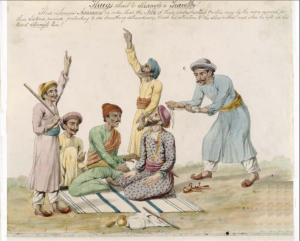Padma Rangarajan
Mellon Humanities Fellow
 Department: English
Department: English
Rank: Associate Professor
# of years at UCR: 3
Top three texts I would take to a desert island: The Mahabaratha, A Time of Gifts, David Copperfield.
Favorite shows to stream: Sci-fi shows from the ‘80’s and ‘90’s. I love Star Trek: Deep Space Nine, Babylon 5, all that stuff.
Something people might be amazed to know about me: My father pierced my nose. It took him three tries.
An “adventure” I am looking forward to, post-pandemic: Hugs. All the hugs.
Q: My research agenda summed up in one sentence:
I study the literature and history of the British Empire.
Q: Any specific time period within the history of the empire?
My work focuses on complicating easy assumptions about Empire in the 19th century specifically, and the nineteenth century in general. It is such a pivotal period for understanding our present conceptions of culture, race, culture, and the globe.
Q: What can you tell us about your current project?
My book in progress, Thug Life: The British Empire and the Birth of Terrorism, locates the origins of modern terrorism in nineteenth century imperial literature and history.

Image text reads “Thugs about to strangle a traveler! These infamous Assassins in order that the neck of their unsuspecting victim may be the more exposed for their Satanic purpose, pretending to see something extraordinary, direct his attention to the stars or skies! and when he lifts up his head strangle him!” Source: Dialogues with Thugs and Narratives of Murders (1825-40).
Q: How did you get interested in the literary origins of terrorism?
Several years ago I came across a presentation on cybersecurity by someone working in the Department of Defense. It argued for the legitimacy of the Guantanamo Bay detention center by linking it to policing in British India (and Indiana Jones!). It was such a striking connection that I had to pursue it further.
Q: What do you say when people ask you why you love your work?
I get to spend so much of my time learning about fascinating things, and I never know exactly where my research will take me. I just spent half a day recently reading Victorian tiger-hunting narratives, which are disturbing and interesting at the same time.
Q: If you could make one change to the structure of higher education today, what would it be?
I would greatly reduce adjunct teaching and greatly expand the ranks of tenured professors. The precariousness and uncertainty of adjuncting, and the second-class status afforded to adjuncts at most universities hurts teachers and students.
Q: What have you learned about teaching from your time in the classroom?
Although it’s very tempting to simply repeat a course over and over, it’s far more valuable to experiment with different techniques for teaching a text, for teaching writing, and for getting students to connect to a text.
Q: Do you have a favorite resource that you encourage students to use?
The Oxford English Dictionary, which I tout over all others because it tracks the changing history of words over time and provides citations! For historical research it’s invaluable to know exactly when and where a word was first used. For my own project, for example, it’s so important to know that the word “terrorism” didn’t exist until the 1790’s.
Q: Have you discovered any tools or tips that enhance remote learning and/or online teaching?
I’m a low-tech instructor by choice, but tools like COVE (Central Online Victorian Educator) that allow students to virtually collaborate on editing and annotating texts are tremendously helpful for giving students dynamic access to rare/expensive texts and editions.
***
In Focus is a interview series that features faculty associates of the Center for Ideas and Society.
